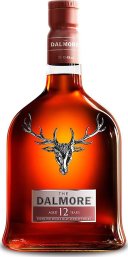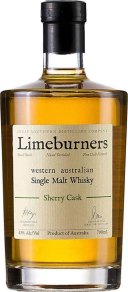Dalmore 12 Year Old Single Malt Scotch Whisky
The Dalmore story began in 1839 with Alexander Matheson who lived in the Highlands of Northern Scotland. Matheson found the rich peat and pure water sources of the Highlands to be the makings of a perfect whisky. He built a distillery in the area and produced small batches until 1886, when the Mackenzie family acquired his operation. When a member of the Mackenzie family risked his own life to save Scotland’s ruler, King Alexander III, from a charging stag, the grateful king offered a token of his appreciation by bequeathing the stag to the Mackenzie family as a symbol of valor and courage. And more than 130 years later, the stag head still appears on every bottle of The Dalmore. Today, Dalmore distillery has ten stone warehouses and eight pot-stills, several which date back to the late 1800s. Much of the distillery burned down during World War I while occupied by the U.S. Navy, but production resumed in 1922. The production process is meticulous and includes double distillations in copper pot-stills and aging in white oak and sherry wood casks.
Laphroaig 10 Year Old Sherry Oak Finish Single Malt Scotch Whisky
Sherry and peat can be a challenging equation as the wine can almost cancel the peat. Some distilleries manage to get the balance right, creating a new and interesting take on much-loved classics (if your preference when drinking Laphroaig is to have it as coastal and earthy as possible, this may not be for you). The sherry oak finish isn't generally available in Australia, and we've only been able to secure a tiny volume. It has a higher ABV in its favour - the standard 10YO is just 40% - with Oloroso sherry casks in support. Apart from the expected smoke, seaweed and salt, you'll find notes of manuka honey, bacon and maple syrup. Probably lightly filtered, but it's not stated on the label. 48% Alc./Vol. Very limited stocks.
Nikka Miyagikyo Single Malt Japanese Whisky
"One for no age statement naysayers... Eloquent & beautiful." - whiskyadvocate.com Back in 2015, Nikka announced they were discontinuing their age statement and No Age Statement (NAS) releases for the Yoichi and Miyagikyo labels and consolidating them into two new bottlings. These whiskies have now arrived in Australia. Two NAS versions that differ slightly to the previous versions now represent the entire portfolio. It was yet another move that triggered a buying rush. Reports have it that Tokyo is now pretty much out of age statement Japanese whiskies, unless you visit bars or auction houses. Nikka's reasons for the radical new strategy are now familiar. They simply have no old stocks to sell. Decades ago, both local and world demand for Japanese malts was low, so few barrels were being laid down for extended periods. Stefan Van Eycken, writing for www.nonjatta.com explains "...there were years, at both Yoichi and Miyagikyo distillery, when the barrels laid down for maturation could be counted on the fingers of one hand. The ‘stock shortage’ is not an excuse or a PR stunt – it’s very real. Sources within Nikka have said that it is ‘likely’ that age-statement single malts will be brought back in 5 or 6 years’ time. No official statement to that effect has been made for the simple reason that doing so – in Japan – would be interpreted as a promise (which could come back to haunt them in 6 years’ time)." The dropping of age statements doesn't always translate into a drop in quality. Early reviews for both releases have been very positive. Evidently, Chief blender Tadashi Sakuma has risen to the challenge of creating a great assemblage from a restricted inventory.
Laphroaig PX Single Malt Scotch Whisky
"Unquestionably one of the great malts of the year...in spite of itself". - Jim Murray Tasting note: Deep gold / brass. Muted at first; builds with a PX top note almost overwhelming the expected distillery aromas; if only momentarily. Brandy soaked raisins and dark chocolate amid flashes of sweet peat and pepper. Three to four minutes exposure draws out smouldering cedar, cigar box and hints of elastoplast, accenting fruit cake in later inspections. Terrific balance in the sweet, smokey-malt mid palate; vanilla and Christmas cake add richness to the finish. Concludes prolonged and lozenge-like with Laphroaig's trademark medicinal edge and pepperiness breaking through late, finally checked by the sherry. Big PX influence here but deftly handled - think of it as drunken Christmas pudding, Islay-style . 48% Alc./Vol. Normally travel retail exclusive. Extremely limited stocks.
Lindores MCDXCIV Single Malt Scotch Whisky
Lindores Abbey is the officially recognised site of the first recorded distillation of Scotch whisky. It was back in 1494 that King James IV commissioned Brother John Cor at Lindores Abbey to make aqua vitae with eight bolls of malt. For more than 100 years, the preservation of the ruined abbey has fallen to Drew McKenzie-Smith and his family. Several years ago he learned of the abbey’s significance to the industry after visiting a website called Connoisseur Scotland . Further inspiration came when he was shown a copy of the late Michael Jackson’s book, ' Scotland and Its Whiskies .' In it, Jackson wrote of Lindores, “For the whisky lover it is a pilgrimage”. Following fifteen years of careful planning, construction work began on a new distillery that would not only capitalise on this whisky connection but also provide the means with which to preserve the abbey for future generations. In 2017, after five centuries of silence, the stills at Lindores Abbey began flowing again. There are actually two releases now in Australia: Lindores MCDXCIV and the MCDXCIV Commemorative First Release. They're essentially the same liquid, distinguished by a subtle notation on the label. Both come aged in a combination of ex-bourbon, ex-sherry and STR red wine barriques from Burgundy. Both are three and a half year old Lowlanders. You might expect Lindores to be on the lighter side, however it's more like a young Speysider, nicely balanced and not shy on flavour. There's even a nod to Linkwood on the nose where the aromas show surprising weight; Cream tea biscuits, pear drops, light beeswax, cocoa and citrus are echoed with impressive purity, depth and texture of the palate. A fine astringency checks the length, but it's auspicious as far as inaugural releases go - all that's needed is more time to add further layers of complexity. 46% Alc./Vol. Tasted from a 15ml sample.
Bladnoch Vinaya Single Malt Scotch Whisky
At the time of writing, 'Vinaya' is the distillery’s widest release since the Lowland project was resurrected by Australian, David Prior and Head Distiller Dr. Nick Savage in 2015. The name comes from a Sanskrit word meaning ' respect and gratitude'. Says Dr.Savage, “As we embark on the 204th year of Bladnoch, the launch of Vinaya feels particularly significant. It is important for us to show gratitude to the previous custodians of this historic brand and estate as we move forward into our most ambitious year yet.” As for the whisky, it's matured in first fill ex-Bourbon and first fill ex-Sherry casks, which is a new combination for Bladnoch. Pale gold in colour, Vinaya is a bit sleepy on the nose, but teases out light apple, pear and vanilla. It's a spritely and youngish tasting malt with a faint backdrop of orchard fruits, developing richness on the back palate but overall remaining relatively tight, crisp and brisk, placing this in the realm of aperitifs. It's also one of the most affordable in the line up, so if you're looking to introduce yourself to Bladnoch's house style, start here. 46.7% Alc./Vol. Non chill filtered.
Great Southern Distillery Limeburners Sherry Single Malt Australian Whisky ( ) -
This Limeburners is matured in second fill bourbon barrels and finished in very old, small sherry cask. Exhibiting spice and fruit aromas when neat, a splash of water unleashes malted barley, aromas of sherry and vanilla with hints of honey, raisins and buttery caramel. 43% Alc./Vol.
Glen Moray 18 Year Old Single Malt Whisky
The Glen Moray 18 year old is a beautiful addition to the Glen Moray Heritage range. Only the very finest American oak barrels have been selected to emphasise the incredibly smooth character and taste of Glen Moray 18 year Single Malt. An intense whisky with a perfect structure, the soft flavours of sweet vanilla balanced with oak from the casks.
Fleurieu Distillery Albatross Single Malt Whisky
The wandering storm bird. Said to be the souls of lost sailors, these roaming aeronauts glide endlessly over the vast and sometimes inhospitable Southern Ocean. Seen as an omen of both good luck and bad, these occasional visitors to our shores perfectly embody grace endurance and fragility.
Launceston Single Malt Whisky Bourbon
Drawing from twelve small American Oak casks; a light engaging whisky with fragrant aromas, double distilled and non-chill filtered to retain depth of character. Colour Rich dark gold.Nose Bright fragrant aromas with hints of vanilla, honey and pears.Taste A soft mouthfeel with subtle sweet bourbon notes, vanilla, honey and green fruit.Finish A pleasant, smooth and lingering finish. The Distillery at Hangar 17Launceston Distillery produce hand-crafted, small-batch whisky. Using traditional techniques and craftsmanship, head distiller Chris Condon uses Tasmanian malted barley and pure river water to produce the finest quality single malt whisky.From grain to bottle everything happens under the roof of Hangar 17, neighbouring Launceston Airport.








